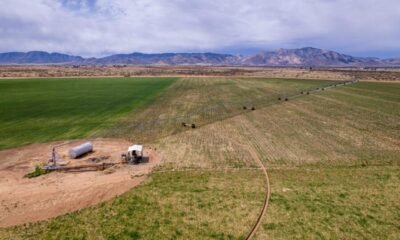agencies
Water Officials Push for Backup Supply Amid Uncertain Colorado River Agreements

Negotiations over the Colorado River’s water allocation are ongoing, as tensions rise between upper and lower basin states. A deal must be struck to address anticipated cuts in water supply due to dwindling resources.
If Arizona faces reductions, the state will need alternative water solutions. Governor Katie Hobbs has indicated that legal action is on the table if Arizona does not receive its fair share of water.
Officials assure Arizonans that there is no imminent threat of total water loss. However, the state’s water chief, Tom Buschatzke, warns that without a resolution, lifestyle adjustments may be necessary.
On May 13, Buschatzke highlighted ongoing stalemates in negotiations. The upper basin states—Colorado, New Mexico, Utah, and Wyoming—assert they should not bear future cuts in water allocation, despite the urgent need for collaborative action.
“It’s crucial for the upper basin states to consider equitable reductions,” Buschatzke stated. “The consequences of inaction will be significant.”
Potential changes could start with regulations on residential landscaping and a push for alternative water sources. One such approach is the controversial “toilet-to-tap” method, where processed wastewater is reintroduced into the drinking supply.
Buschatzke emphasized the importance of maintaining wildlife and riparian habitats, adding that the state must prioritize these resources in policy discussions. He also noted the economic impact of reduced water availability.
The historical context is stark; the water supply projected in a 1922 agreement is no longer attainable. Arizona and neighboring states believe the upper basin must contribute more than 8.3 million acre-feet annually, a volume sufficient for several households.
Despite the upper basin’s claims of reduced flow, Arizona insists on shared responsibility for reductions. A failure to reach an agreement could result in federal intervention, which may not favor the lower basin states.
Buschatzke pointed out that the current administration may be more open to negotiations than the previous one, representing a potential opportunity for collaborative solutions.
In preparation for various scenarios, Arizona is laying groundwork for a lawsuit. Governor Hobbs supports setting aside funds for legal counsel if the situation deteriorates, urging a fair resolution to prevent harm to Arizona’s interests.
Hobbs emphasized the significance of Arizona’s economy to the nation, highlighting the need for sustainable growth in alignment with critical mineral mining.
Regarding proposed projects like the new copper mine at Oak Flat, Hobbs refrained from commenting on water allocation implications, acknowledging the complex balance between economic and environmental considerations.
She also recognized the lack of transparency in industrial water usage data, suggesting it might be time for a review to enhance public engagement in water resource management.
The discussions around water allocation exemplify a pivotal moment for Arizona, necessitating decisive action and strategic planning to secure its future.


















